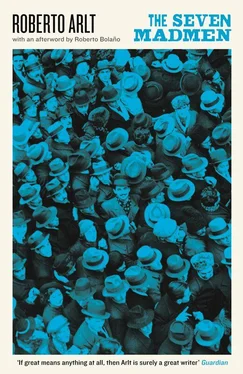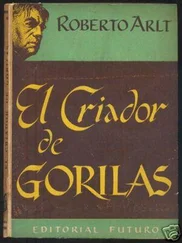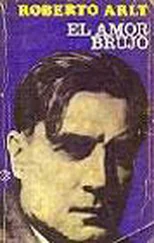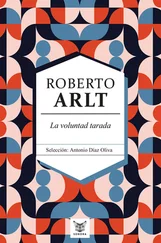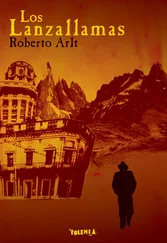Erdosain had been on the point of asking him if his mother had been taken in by a lie like that, as if Hipólita’s face bore the traces of the harsh ways she had earned her living …
“How did your mother react?”
“She told me to take her home at once. When I presented her, she kissed her and asked: ‘Has he respected you, daughter?’ And Hipólita lowered her gaze and responded ‘Yes, mamma.’ What’s more, it was true. I should tell you that both she and my sister Sara are delighted with her.”
When he said that, Erdosain had the sudden foreboding that this hapless couple were heading for disaster. He had not been mistaken, and as he sat in the underground train while it rumbled through Liniers, he remembered how right he had been and said to himself: “It’s strange, first impressions are never wrong.” Back then, he had asked Ergueta when they were getting married:
“We’re leaving for Montevideo tomorrow. That’s where we’re holding the ceremony, in case we don’t get on” — as he said this, his eyebrow shot up again and he smiled cynically, adding: “I’m nobody’s fool, you know.”
Erdosain was incensed at this kind of precaution. Unable to restrain himself, he protested:
“How’s that? … You’re not yet married but you’re already thinking about divorce? So what kind of a communist act is that? Deep down you’re still just a cheating gambler.”
The pharmacist simply gloated at this, as proud of himself as a loan shark who will accept any insult provided it’s made by someone paying up. He cackled:
“You have to be on the ball, my friend.”
Erdosain was appalled by such a callous attitude.
He thought of the delicious creature in the photo and imagined her having to put up with this monster under a sky swept by dark dust clouds and an awful burning yellow sun. She would wilt like a fern transplanted to a rock pile. Erdosain stared angrily at his companion.
The gambler noticed how annoyed he was, but said:
“I have to do something to bring down this society. There are days when I suffer unbearably. It’s as if everything that happens is out of control, like a plunging wild beast. It makes me want to go out into the street and preach mass murder, or to set up a machine gun on every street corner. You must see it: terrible times are coming.
“‘The father shall be divided against the son, and the son against the father.’ We have to do something to strike back at this accursed society. That’s why I’m marrying a prostitute. As the Scriptures say: ‘And you, son of man, are to judge the bloodthirsty city, and to show all its abominations.’ And what about this, just listen to this: ‘And she fell in love with thieves whose flesh is as that of asses, whose liquids stream out like those of horses.’” At that he turned and pointed to the pimps clustered round the tables playing cards, and said: “Look at them. Go into the Royal Keller, to Marzzoto’s, to the Pigall or the Maipú, and you’ll see them everywhere. Lost souls. Even riff-raff like them are bored to death. Come the revolution and they’ll either be strung up or sent to the front line. Cannon fodder. I could have been like them, but I changed my mind. A terrible time is coming. That’s why the holy book says: ‘I will save the Cripple and return the lost sheep to the fold because the city is enamoured of its thieves, and they are the ones who crushed the Cripple and led the sheep astray, but some day soon they will have to prostrate themselves and kiss their feet.’”
“But do you love Hipólita?”
“Of course I do. Sometimes I think she must have climbed down from the moon on a ladder. Wherever she is, people will be happy.”
And for an instant Erdosain truly believed she had indeed climbed down from the moon so that the whole of mankind could rejoice in her calm simplicity.
The pharmacist went on:
“A time of blood is at hand, a time of vengeance. The soul of mankind is weeping. But no-one wants to listen to the tears of their angel. And our cities are like the whores, enamoured of their criminals, their thieves. It can’t go on.”
He stared out into the street for a moment, and then said in a sorrowful tone, as if listening to a voice inside him in this sad café:
“What we need is for someone, some angel, to appear. People would fall to their knees in the Avenida de Mayo. Cars would come to a halt, bank managers and the rich in their hotels would come out on to their balconies and wave their arms about, shouting at him indignantly: ‘What do you want, toad face? Don’t bother us’, but he will arise, and their arms will drop to their sides when they see his tiny soulful face, his eyes burning with fever, and he’ll address all these stuck-up people, he’ll talk to them, ask them why they have done wrong, why they have forgotten the orphans and abused their fellow man, why they’ve made a hell out of life when it can be so beautiful. And they’ll not know what to answer, and the voice of the avenging angel will ring out so loudly that their hair will stand on end, and even the most heartless of them will weep.”
The pharmacist’s bulging mouth twisted in anguish, as if he had swallowed a viscous, bitter poison.
“Yes, we need Christ to come again. Even the lowest of men, even the most disgusting cynics are full of suffering. And if He doesn’t come, who else can save us?”
The train stopped at Ramos Mejía. The station clock was showing eight at night. Erdosain got off.
A dense fog hung over the muddy streets of the suburb.
Away from the station in Centenario, with a wall of fog in front and another behind him, he remembered that the next day they were going to kill Barsut. It was true. They were going to kill him. Erdosain would have liked to have a mirror to hold up so he could see his murderer’s body, so incredible did it seem that he was the one (the “I”) who through this crime was about to separate himself from the rest of humanity.
The streetlamps shone feebly, their shafts of woolly light only penetrating the dark of the pavements for a couple of yards, while the rest of the suburb remained invisible. Filled with an immense sorrow, Erdosain walked on as disconsolate as a leper.
He felt as though his soul had finally become detached for ever from any human emotion. His anguish was that of a man who carries a fearful cage inside him, where prowling, blood-stained tigers yawn among a heap of fish bones, their remorseless eyes poised for their next leap.
As he walked on, Erdosain considered his life as if it were this other person’s, trying to understand the forces that rose from the tips of his fingernails to howl in his ears like a hot dusty wind.
Immersed in the fog whose clammy dankness penetrated even the furthest recesses of his lungs, Erdosain eventually reached Gaona, where he stopped to wipe the sweat from his brow.
He banged on a wooden gate, the only entrance to a huge shed lit by a single kerosene lamp. A hand pulled the door open, then the figure of a young man muttering obscenities disappeared round the corner of the building along a brick path that rocked uneasily under his feet in the mud.
Erdosain came to a halt outside a lighted glass door. He clapped his hands and a hoarse voice shouted: “Come in!”
Erdosain went in.
The sooty flame of an oil lamp lit the five heads of the Espila family, as they peered up from their supper plates. They all greeted him with cheerful smiles, and Emilio Espila, a tall thin youngster with a mop of hair, leapt up to shake his hand.
Erdosain greeted them one by one: first the mother, bent double by her years and dressed all in black; then Luciana and Elena, the two young sisters; then Eustaquio, who was deaf and such a long thin streak of a man it seemed he must have tuberculosis. As usual, he was poring over a magazine while his nose was deep in his plate, his grey eyes flitting to and fro as they deciphered the pictures.
Читать дальше
